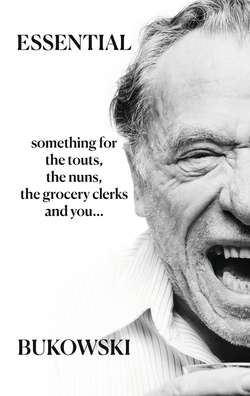Читать книгу Essential Bukowski: Poetry - Чарльз Буковски, Abel Debritto - Страница 6
INTRODUCTION
ОглавлениеWith more than twenty Charles Bukowski poetry books now available in print and dozens of first-rate unpublished poems on file, an essential collection has been long overdue. The task at hand was titanic: A prolific author by any measure, with some five thousand poems on record written over a span of fifty years, Bukowski famously wrote almost every night in an alcoholic stupor, trashing most of the gibberish the morning after. Picking Bukowski’s best poems out of this massive heap was daunting, to say the least.
“The bluebird,” “the genius of the crowd,” “roll the dice,” “the crunch,” and other popular poems were strong contenders even before I put together a tentative list. As I pored over both the published and the unpublished work, some relatively obscure gems, such as “when Hugo Wolf went mad,” “sparks,” “the loser,” and “another academy” came back to life for me. I also included poems that were pivotal in Bukowski’s career, like “swastika star buttoned to my ass,” which moved longtime German translator, agent, and friend Carl Weissner to become a fervent Bukowski enthusiast after reading it in a small press magazine in England in 1966. There were one hundred and seventy poems in my final selection for the book, which then had to be cut down to only ninety-two—“democracy,” “they, all of them, know,” “the word,” and other top-notch poems had to be discarded.
These ninety-two essential poems barely represent two percent of Bukowski’s mammoth output, but his poetic evolution is hard to miss in this chronological collection. The early poems, with their lyricism and occasional surreal imagery, give way in the 1970s to Bukowski’s “Dirty Old Man” macho persona, when he finally achieves success in his fifties, after which he takes, in his final years, a more philosophical stance on life. Through it all, what remains the same is Bukowski’s brilliance at capturing things as they are, his crystal-clear snapshots of his immediate experiences as well as the world at large, which he hardly ever photoshopped after the fact.
It is precisely this genuineness, along with the timeless quality of Bukowski’s most accomplished poems, that makes us embrace his poetry with open arms: the day-to-day but crucial trivialities found in “the shoelace”; the sensuality of “the shower”; the forces of life at work in “the mockingbird” and “the history of a tough motherfucker”; the elusive nature of art in many of the poems; the self-deprecating humor in “we’ve got to communicate”; the imperfection that makes us almost perfect in “one for the shoeshine man”; and the heartfelt portraits of the artists that Bukowski looks up to.
There’s also the striking, disarming simplicity of “art” and “nirvana”; the Hemingwayesque spare lines of “Carson McCullers” and “hell is a lonely place”; the hymns to individualism and willpower of “no leaders” and “the genius of the crowd”; the never-take-things-for-granted spirit of “I met a genius”; the long narrative poems that read as well-paced short-stories; and the life-affirming drive of “the laughing heart” and “the crunch.” These last two poems show that, despite the darkness that often entered his life and poetry, Bukowski always saw the light at the end of the tunnel, and we can’t help but identify with that feeling.
These poems are Bukowski at his most captivating: unvarnished, witty, and passionate, showing us all “the way” as he listens to classical music on “a radio with guts” and drinks “the blood of the gods” in his small Los Angeles apartments and studios. The Buddha of San Pedro, Bukowski ultimately smiles because he knows the secret of it all is way beyond him, and that’s the beauty of it: Bukowski distills life to its very essence, squeezing the magic out of the ordinary with his unmistakable, surpassing simplicity.
Essential, indeed.
